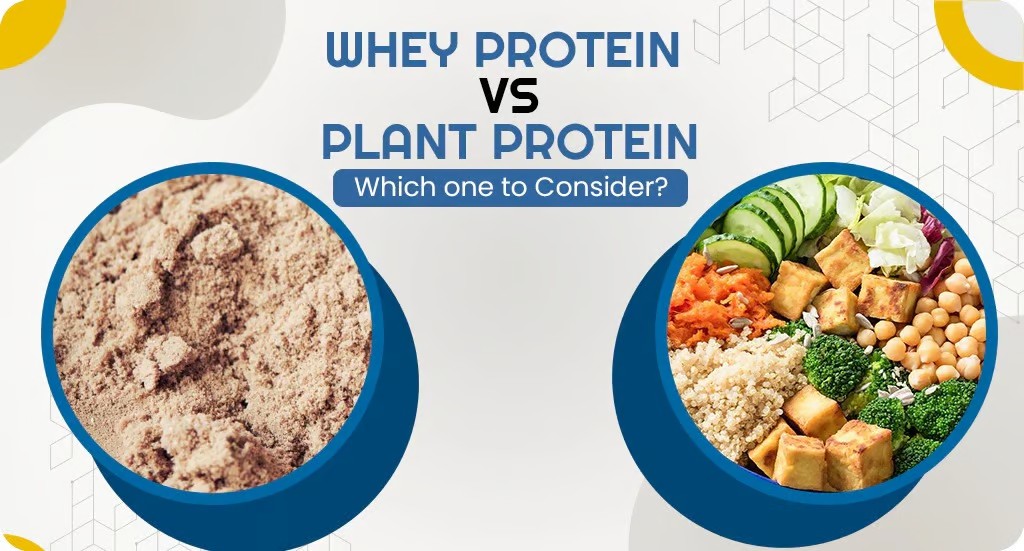Whey Protein vs Plant Protein for Nutritional Benefits: Which One Should You Choose in 2025?
In 2025, with the supplement market booming and personalized nutrition becoming the norm, the debate over whey protein vs plant protein for nutritional benefits is more relevant than ever. Whether you’re a gym-goer building lean muscle, a vegan striving for clean gains, or someone managing health conditions like PCOS or lactose intolerance, your protein source matters. But which one is right for you?
Let’s dive into a detailed comparison backed by science, expert insight, and real-world considerations.
What is Whey Protein?
Whey protein is a complete protein derived from milk during the cheese-making process. It’s rich in essential amino acids, especially Branched-Chain Amino Acids (BCAAs), which are vital for muscle repair and growth.
Types of Whey Protein:
- Whey Concentrate: 70–80% protein, contains fats and lactose.
- Whey Isolate: 90%+ protein, lower in fats/lactose – ideal for those with mild intolerance.
- Whey Hydrolyzed: Pre-digested for faster absorption and minimal allergenicity.
Key Benefits:
- Rapid absorption post-workout
- Superior muscle recovery support
- High BCAA content
- Excellent bioavailability (PDCAAS score: 1.0)
What is Plant Protein?
Plant protein is derived from sources like peas, soy, hemp, brown rice, and pumpkin seeds. While not always complete on their own, they are often blended to provide a full amino acid profile.
Common Sources:
- Pea Protein: Hypoallergenic, rich in iron
- Soy Protein: Complete amino acid profile
- Brown Rice Protein: Easily digestible
- Hemp Protein: Omega-rich, fiber-dense
Key Benefits:
- Ideal for vegans and vegetarians
- Naturally lactose-free and dairy-free
- Contains fiber and micronutrients
- Lower carbon footprint
Whey vs Plant Protein – Nutritional Comparison Table
| Nutrient/Feature | Whey Protein (Isolate) | Plant Protein (Blend) |
| Protein per 30g scoop | 25–27g | 20–24g |
| BCAA content | ~5.5g | ~4–5g |
| Carbs | 1–3g | 2–6g |
| Fat | <1g | 1–3g |
| Digestibility | Fast | Moderate |
| Allergens | Dairy | Soy (optional), Gluten-free |
| Sustainability | Moderate | High |
Which One is Better for Your Goals?
💪 For Muscle Gain:
Whey protein has an edge due to its rapid absorption and high BCAA content, making it the best protein for muscle gain post-workout.
⚖️ For Weight Loss or Fat Loss:
Both are effective, but plant protein blends with added fiber can support satiety better.
💚 For Vegan or Lactose-Intolerant Users:
Plant protein is the clear winner. It’s free from dairy and often easier on the stomach—ideal for those looking for protein sources for lactose intolerance.
👩⚕️ For Women with PCOS or Hormonal Concerns:
Plant proteins may support better insulin response and reduce inflammation, depending on the formulation.
🤰 For Digestion and Gut Health:
Hydrolyzed whey and fermented plant proteins are both good choices for improving digestion and protein absorption.
Sustainability, Allergens, and Digestibility
Plant proteins come out ahead in terms of sustainability. They use less water, produce fewer emissions, and are suitable for individuals with dairy or soy allergies when using allergen-free blends. However, whey isolate is filtered enough to be tolerable for many with mild lactose sensitivity.
Expert Verdict & Final Recommendation
As a nutrition expert with hands-on experience coaching both athletes and everyday supplement users, here’s my take:
- Choose Whey Protein If: You prioritize muscle growth, fast recovery, and high leucine content.
- Choose Plant Protein If: You follow a plant-based lifestyle, struggle with digestion, or value environmental sustainability.
Still unsure? Try both! Many users find a hybrid approach works best—using whey post-workout and plant protein for meals or snacks.
Local Relevance – Pakistan Market Insight
In Pakistan, whey protein remains the top choice for gym-goers, but price plays a crucial role. The whey protein price in Pakistan varies depending on brand, type, and authenticity—ranging from PKR 10,000 to PKR 20,000 per 2 lbs tub. Meanwhile, plant proteins are slowly gaining traction due to increased awareness and availability of certified vegan products.
🧠 Final Thoughts
Both whey and plant proteins offer distinct nutritional advantages. The right choice ultimately depends on your fitness goals, dietary restrictions, and lifestyle values. Prioritize clean, certified products and consult a nutritionist if you have underlying conditions.

